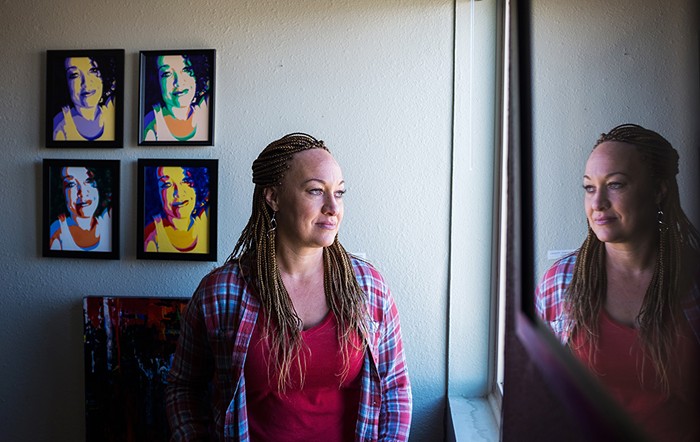The Stranger
2017-04-19
I’m sitting across from Rachel Dolezal, and she looks… white. Not a little white, not racially ambiguous. Dolezal looks really, really white. She looks like a white woman with a mild suntan, in box braids—like perhaps she’d just gotten back from a Caribbean vacation and decided to keep the hairstyle for a few days “for fun.”
She is also smaller than I expected, tiny even—even in her wedge heels and jeans. I’m six feet tall and fat. I wonder for a moment what this conversation might look like to bystanders if things were to get heated—a giant black woman interrogating a tiny white woman. Everything about Dolezal is smaller than expected—the tiny house she rents, the limited and very used furniture. Her 1-year-old son toddles in front of cartoons playing on a small television. The only thing of real size in the house seems to be a painting of her adopted brother, and now adopted son, Izaiah, from when he was a young child. The painting looms over Dolezal on the living-room wall as she begins to talk. I try to get my bearings and listen to what she’s trying to say, but for the first few moments, my mind keeps repeating: “How in the hell did I get here?”
I did not want to think about, talk about, or write about Rachel Dolezal ever again. While many people have been highly entertained by the story of a woman who passed herself off for almost a decade as a black woman, even rising to the head of the Spokane chapter of the NAACP, before being “outed” during a TV interview by KXLY reporter Jeff Humphrey as white, as later confirmed by her white parents, I found little amusement in her continued spotlight. When the story first broke in June 2015, I was approached by more editors in a week than I had heard from in two months. They were all looking for “fresh takes” on the Dolezal scandal from the very people whose identity had now been put up for debate—black women. I wrote two pieces on Dolezal for two different websites, mostly focused not on her, but on the lack of understanding of black women’s identity that was causing the conversation about Dolezal to become more and more painful for so many black women.
After a few weeks of media obsession, I—and most of the other black women I knew—was completely done with Rachel Dolezal.
Or, at least I hoped to be…
Read the entire interview here.
